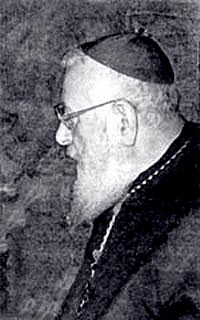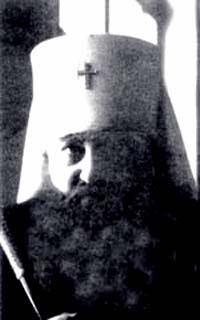
Atila Sinke Guimarães
| Why didn’t the last Ecumenical Council condemn Communism? A secret accord made at Metz supplies an answer. Those who pass by the convent of the Little Sisters of the Poor in Borny - on the outskirts of the French city of Metz - never imagine that something of transcendental importance occurred in the residence of Fr. Lagarde, the convent’s chaplain. In a hall of this religious residence in August 1962 - two months before Vatican Council II opened - a secret meeting of the greatest importance between two high-ranking personalities took place.
This encounter had consequences that changed the direction of Council, which was already prepared to open. In effect, the meeting at Metz determined a change in the trajectory of the very History of the Church in the 20th century. What was the matter of such great importance that was resolved at his meeting? Based on the documents that are known today, there it was established that Communism would not be condemned by Vatican Council II. In 1962, The Vatican and the Schismatic Russian Church came to an agreement. According to its terms, the Russian “Orthodox Church” agreed to send observers to Vatican II under the condition that no condemnation whatsoever of communism should be made there (1). 1. Ulysses Floridi, Moscou et le Vatican, Paris: France-Empire, Paris, 1979, pp. 147-48; Romano Amerio, Iota Unum, K.C., MO: Sarto House, 1996, pp. 75-76; Ricardo de la Cierva, Oscura rebelion en la Iglesia, Barcelona: Plaza & Janes, 1987, pp. 580-81.And why were the consequences of such a pact so far-reaching and important? Because in the 20th century a principal enemy of the Catholic Church was Communism. As such, until Vatican II it had been condemned numerous times by the Magisterium. Moreover, in the early ’60s a new condemnation would have been quite damaging, since Communism was passing through a serious crisis, both internally and externally. On one hand, it was losing credibility inside the USSR since the people were becoming increasingly discontent with the horrendous administrative results of 45 years of Communist demagogy. On the other hand, outside the USSR Communism had not been able to persuade the workers and poor of free countries to take up its banner. In fact, up until that time it had never won a free election. Therefore, the leaders of international Communism decided that it was time to begin to change the appearances of the regime in order to retain the power they had and to experiment with new methods of conquest. So in the ‘60s President Nikita Khrushchev suddenly began to smile and talk about dialogue (2). 2. Plinio Correa de Oliveira, Unperceived Ideological Transshipment and Dialogue, New York: Crusade for a Christian Civilization, 1982, pp. 8-15.This would have been a particularly inopportune moment for the Pope or the Council to issue a formal condemnation, which could have either seriously damaged or possibly even destroyed the Communist regime.. A half secret act Speaking about the liberty at Vatican II to deal with diverse topics, Professor Romano Amerio revealed some previously unpublished facts. “The salient and half secret point that should be noted,” he stated, “is the restriction on the Council’s liberty to which John XXIII had agreed a few months earlier, in making an accord with the Orthodox Church by which the patriarchate of Moscow accepted the papal invitation to send observers to the Council, while the Pope for his part guaranteed the Council would refrain from condemning Communism. The negotiations took place at Metz in August 1962, and all the details of time and place were given at a press conference by Mgr. Paul Joseph Schmitt, the Bishop of that Diocese [newspaper Le Lorrain, 2/9/63]. The negotiations ended in an agreement signed by metropolitan Nikodim for the Orthodox Church and Cardinal Tisserant, the Dean of the Sacred College of Cardinals, for the Holy See. 3. Romano Amerio, Iota Unum, pp. 65-66.Thus the Counci, which made statements on capitalism and colonialism, said nothing specific about the greatest evil of the age, Communism.. While the Vatican Monsignors were smiling at the Russian Schismatic representatives, many Bishops were in prison and innumerable faithful were either persecuted or driven underground for their fidelity to the Holy Roman Catholic Church. The Kremlin-Vatican negotiations This important information about Vatican-Kremlin negotiations is confirmed in an article ‘The mystery of the Rome-Moscow pact’ published in the October 1989 issue of 30 Dias, which quotes statements made by the Bishop of Metz, Paul Joseph Schmitt. In a February 9, 1963 interview with the newspaper Republicain Lorrain, Mgr. Schmitt said: “It was in our region that the ‘secret’ meeting of Cardinal Tisserant with archbishop Nikodin occurred. The exact place was the residence of Fr. Lagarde, chaplain for the Little Sister of the Poor in Borny [on the outskirts of Metz]. Here for the first time the arrival of the prelates of the Russian Church was mentioned. After this meeting, the conditions for the presence of the Russian church’s observers were established by Cardinal Willebrands, an assistant of Cardinal Bea. Archbishop Nikodin agreed that an official invitation should be sent to Moscow, with the guarantee of the apolitical character of the Council” (4). 4. 30 Dias, October 1988, pp. 55-56.The same source also transcribed a letter of Bishop Georges Roches regarding the Pact of Metz: “That accord was negotiated between the Kremlin and the Vatican at the highest level .… But I can assure you …. that the decision to invite Russian Orthodox observers to Vatican Council II was made personally by His Holiness John XXIII with the encouragement of Cardinal Montini, who was counselor to the Patriarch of Venice when he was Archbishop of Milan…. Cardinal Tisserant received formal orders to negotiate the accord and to make sure that it would be observed during the Council” (5). 5. Ibid. p. 57In a book published some time after this, German theologian Fr. Bernard Häring - who was secretary-coordinator at the Council for the redaction of Gaudium et Spes - revealed the more profound reason for the ‘pigeon-holing’ of apetition that many conciliar Fathers signed asking Paul VI and the Council to condemn Communism: “When around two dozen Bishops requested a solemn condemnation of Communism,” stated Fr. Häring, “Msgr. Glorieux …. and I were blamed like scapegoats. I have no reason to deny that I did everything possible to avoid this condemnation, which rang out clearly like a political condemnation. I knew that John XXIII had promised Moscow authorities that the Council would not condemn communism in order to assure the participation of observers of the Russian Orthodox church” (6). 6. 30 Dias October 1989, p. 55.Since the time of Stalin Facts from such indisputable sources permit no doubt about the effectiveness of the Pact of Metz. They also lend credibility to the information presented in the ‘novel’ entitled The Jesuits, by the late Fr. Malachi Martin, a quite well-informed ex-Jesuit who offers similar details about what happened before, during, and after the Pact of Metz. In Martin’s work, the Cardinal Secretary of State, under the pseudonym of Stato, tells about the understanding made by the Holy See with the Kremlin from 1942 to our days: “Stato reminded his Venerable Colleagues that he had been with the present Holy Father at His Holiness’s two meetings with the Soviet negotiator, Anatoly Adamshin, the most recent of which had been earlier this very year of 1981. His Holiness had given the Soviets a guarantee that no word or action, either by His Holiness or the Polish Hierarchy or Solidarity’s leaders, would violate the Moscow-Vatican Pact of 1962. 7. Malachi Martin, The Jesuits - The Society of Jesus and the Betrayal of the Roman Catholic Church, New York: Simon & Schuster, 1987; pp. 85-86.Further on, Malachi Martin “relates” that this Vatican-Moscow pact of 1962 was “merely a renewal of an earlier agreement between the Holy See and Moscow” on the occasion of conversations that took place in 1942 in the pontificate of Pius XII. “It was in that year,” he writes, “that Vatican Monsignor Giovanni Battista Montini, who himself later succeeded to the Papacy as Paul VI, talked directly with Joseph Stalin’s representative. Those talks were aimed at dimming Pius XII’s constant fulminations against the Soviet dictator and Marxism. Stato himself had been privy to those talks. He had also been privy to the conversations between Montini and the Italian Communist Party leader, Palmiro Togliatti, in 1944 .... “Stato offered to supply reports from the Allied Office of Strategic Services about the matter, beginning, as he recalled, with OSS Report JR-1022 of August 28, 1944” (8). 8. Ibid., pp. 91-92.Such, then, are the official documents as well as the extra-official information about the Pact of Metz, which explains the incredible omission at the Ecumenical Second Vatican Council. Some facts that we need to consider 1. Catholic doctrine has always emphatically condemned Communism. It would be possible, should it be necessary, to publish a small book composed exclusively of anti-communist pontifical documents.The point of my article is to gather and present information from several different sources for the consideration of my reader. How can the actions of the Catholic Prelates who inspired, ordered, followed and maintained the decisions of the Pact of Metz be explained? I leave the answer to my reader. |











No comments:
Post a Comment